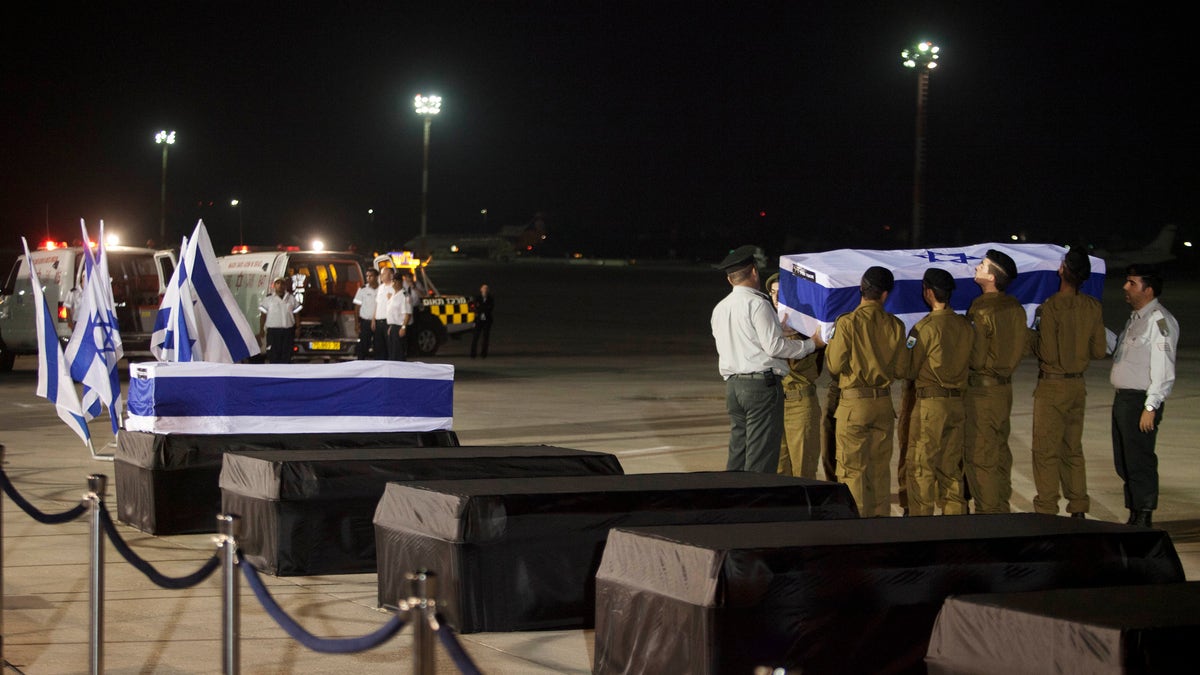
July 20, 2012: Israeli soldiers carry the coffins of people killed in a bombing in Bulgaria as the remains arrived back at an airport in Tel Aviv, Israel.
JERUSALEM – The five Israeli victims of a bombing in Bulgaria were laid to rest in a series of funerals Friday, two days after the bloody attack on a tourist bus at a popular vacation spot set off a new round of charges aimed at Iran.
Israeli and American officials have blamed the Iran-backed Lebanese militant group Hezbollah for the bombing, and authorities in several other countries were trying to confirm the identity of the suicide bomber.
Israel has pledged to hit back at Iran, charging that the bombing was just the latest in a series of attacks against Israelis and Jews abroad. Iran has denied involvement.
Five vacationing Israelis were killed in the blast in the popular Black Sea resort town of Burgas, along with a Bulgarian bus driver and the bomber.
Bulgarian authorities are examining evidence from the deadly blast, trying to confirm the identity of the bomber.
Bulgarian prosecutors said Friday that the man believed to have carried out the suicide attack had a short haircut, not the long hair seen in a security video, and tried to rent a car in the days before the bombing but was turned down because his ID appeared suspicious.
Interior Minister Tsvetan Tsvetanov said the investigation had ruled out that the bomber was a Bulgarian citizen, but did not say how authorities know that.
"Now we are focused on finding out the identity of the suicide bomber and his possible whereabouts ahead of the blast," Tsvetanov said.
Authorities examining his fingerprints, his DNA and his fake Michigan driver's license.
Security camera footage from before the attack showed the suspected bomber wandering in and out of the terminal, wearing a baseball cap over long hair, and a T-shirt, and plaid shorts, with a bulky backpack.
Tsvetanov said the backpack contained the bomb, which detonated in the luggage compartment of the bus. The bomber was believed to have been about 36 years old and had been in the country between four and seven days, Tsvetanov said.
In the central Israeli city of Rishon Lezion, hundreds of mourners joined the family of Cochava Shriki, a 42-year-old woman who had recently become pregnant after years of fertility treatments.
"You were my baby sister, and ever since our mother died, I felt that I always had to protect you, to help you and to guide you," her sister wailed in agony. "Your death leaves a huge void in our lives that cannot be filled."
In nearby Petah Tikva, childhood friends Itzik Kolengi, 28, and Amir Menashe, 27, were buried.
Kolengi's wife, Gilat, was injured in the attack and remains hospitalized. The couple has an infant daughter.
"I promise you that the family and I will watch forever over your wife, Gilat, and your amazing daughter, Noya, who looks exactly like you, and we'll raise her just as you would have wanted," Kolangi's brother David eulogized.
Menashe also left behind an infant son.
In northern Israel, Maor Harush, 26, was laid to rest. His close friend Elior Price, 24, will be buried later Friday. A third friend remains hospitalized in serious condition.
The victims' coffins were received early Friday in a military ceremony at Israel's international airport. Seventeen Israelis remain in hospitals.
Israel has attributed a series of attacks on its citizens around the world in recent months to Iran and its proxies, threatening to escalate a shadow war between the two arch-enemies that has escalated over Israeli allegations that the Iranians are trying to build nuclear weapons.
A U.S. official told The Associated Press on Thursday night that Hezbollah was believed to be behind the attack. The official spoke on condition of anonymity because it was a sensitive intelligence issue and he was not authorized to brief reporters.
Iran denies that its nuclear program is aimed at developing weapons.
Israeli Prime Minister Benjamin Netanyahu said the Bulgaria bombing "was carried out by Hezbollah, the long arm of Iran."
Iranian Foreign Ministry spokesman Ramin Mehmanparast called the accusation "baseless," saying it was aimed at diverting world attention from Israel's role in the assassination of Iranian nuclear scientists.
Israel has officially issued a complaint to the U.N. Security Council, accusing Iran of responsibility for the attack. Israeli representative Haim Waxman wrote the Security Council president that the attack in Bulgaria was part of an international terrorist campaign against Israelis and Jews worldwide, led by Iran and Hezbollah.
The U.N. Security Council unanimously condemned the attack Wednesday night.
The bomb exploded shortly after the Israelis boarded a bus outside the airport in the Black Sea resort town of Burgas, a popular destination for Israeli tourists -- particularly for high school graduates before they are drafted into military service. Burgas is about 250 miles east of the capital, Sofia.
Since the fall of communism, Israel has maintained friendly ties with Bulgaria, a nation of 7.3 million that resisted Nazi demands to deport Jews to death camps in World War II. Many of them migrated to Israel when the Communists seized power after the war. About 5,000 Jews live in Bulgaria today.
